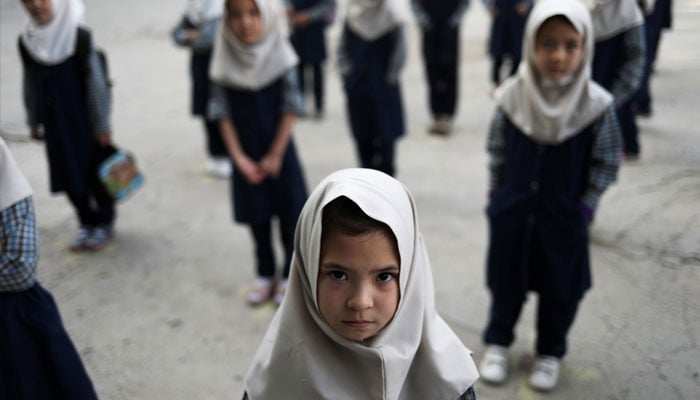Future for our girls
Persistence of this practice reflects deeply entrenched cultural mindset
After years of delay and resistance, there is finally a glimmer of hope for young girls in Pakistan. Last week, the National Assembly passed a long-overdue bill aimed at curbing child marriage, one of the country’s most deeply rooted and damaging practices. On Monday, the Senate followed suit, passing the Islamabad Capital Territory Child Marriage Restraint Bill, 2025, introduced by Senator Sherry Rehman. The bill imposes substantial penalties on those facilitating or engaging in child marriages. But as history shows, passing laws is only half the battle. The real challenge lies in implementing them in both letter and spirit. Senator Rehman, who has persistently pushed for this legislation since 2018, rightly noted that this is not the first time the Senate has passed such a bill. Until now, the National Assembly had stalled its progress multiple times, indicative of the broader resistance within society to confronting harmful traditions. Despite the existence of older laws like the Child Marriage Restraint Act of 1929 and relevant sections in the penal code, the practice of marrying off girls too young remains alarmingly common. In fact, Pakistan is responsible for a staggering 28 per cent of global child marriages.
The persistence of this practice reflects a deeply entrenched cultural mindset. In many communities, girls are seen primarily as future wives and mothers rather than individuals with their own potential. Lawmakers who attempt to challenge these views are often met with backlash that can turn deadly. Beyond ideology and religion, fear also plays a role. In a country where women often cannot travel, live or work freely, parents believe that marriage offers their daughters a semblance of safety. Many fear that girls who pursue education or careers will later reject traditional marriage altogether.
If we are to truly eradicate child marriage, then we must go beyond legislation. Cultural transformation is essential. We must redefine what it means to raise a girl in Pakistan. The focus should shift from preparing girls for marriage to empowering them with education, skills and financial independence. For girls from lower-income families, who are disproportionately vulnerable to early marriage, targeted aid programmes can make a real difference. When a girl has a Plan B, she can confidently resist societal pressures. This new bill is a step in the right direction, but it cannot stand alone. The federal government must work with provincial authorities to ensure nationwide alignment. Civil society, educators and the media must play their part in changing public attitudes. We must tell our daughters that they are more than brides-in-waiting. Their dreams matter. Their education matters. Their contribution to our society matters.
-
 Winter Olympics 2026: Lindsey Vonn’s Olympic Comeback Ends In Devastating Downhill Crash
Winter Olympics 2026: Lindsey Vonn’s Olympic Comeback Ends In Devastating Downhill Crash -
 Adrien Brody Opens Up About His Football Fandom Amid '2026 Super Bowl'
Adrien Brody Opens Up About His Football Fandom Amid '2026 Super Bowl' -
 Barbra Streisand's Obsession With Cloning Revealed
Barbra Streisand's Obsession With Cloning Revealed -
 What Did Olivia Colman Tell Her Husband About Her Gender?
What Did Olivia Colman Tell Her Husband About Her Gender? -
 'We Were Deceived': Noam Chomsky's Wife Regrets Epstein Association
'We Were Deceived': Noam Chomsky's Wife Regrets Epstein Association -
 Patriots' WAGs Slam Cardi B Amid Plans For Super Bowl Party: She Is 'attention-seeker'
Patriots' WAGs Slam Cardi B Amid Plans For Super Bowl Party: She Is 'attention-seeker' -
 Martha Stewart On Surviving Rigorous Times Amid Upcoming Memoir Release
Martha Stewart On Surviving Rigorous Times Amid Upcoming Memoir Release -
 Prince Harry Seen As Crucial To Monarchy’s Future Amid Andrew, Fergie Scandal
Prince Harry Seen As Crucial To Monarchy’s Future Amid Andrew, Fergie Scandal -
 Chris Robinson Spills The Beans On His, Kate Hudson's Son's Career Ambitions
Chris Robinson Spills The Beans On His, Kate Hudson's Son's Career Ambitions -
 18-month Old On Life-saving Medication Returned To ICE Detention
18-month Old On Life-saving Medication Returned To ICE Detention -
 Major Hollywood Stars Descend On 2026 Super Bowl's Exclusive Party
Major Hollywood Stars Descend On 2026 Super Bowl's Exclusive Party -
 Cardi B Says THIS About Bad Bunny's Grammy Statement
Cardi B Says THIS About Bad Bunny's Grammy Statement -
 Sarah Ferguson's Silence A 'weakness Or Strategy'
Sarah Ferguson's Silence A 'weakness Or Strategy' -
 Garrett Morris Raves About His '2 Broke Girls' Co-star Jennifer Coolidge
Garrett Morris Raves About His '2 Broke Girls' Co-star Jennifer Coolidge -
 Winter Olympics 2026: When & Where To Watch The Iconic Ice Dance ?
Winter Olympics 2026: When & Where To Watch The Iconic Ice Dance ? -
 Melissa Joan Hart Reflects On Social Challenges As A Child Actor
Melissa Joan Hart Reflects On Social Challenges As A Child Actor




